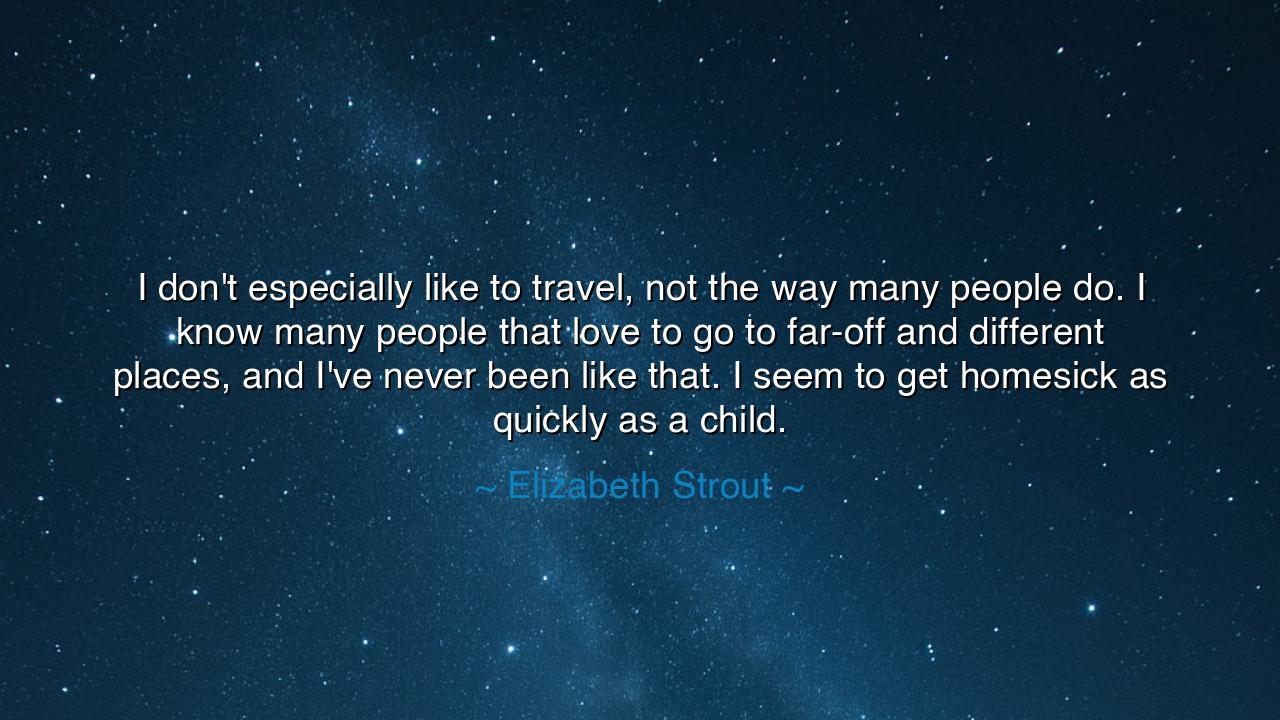
I don't especially like to travel, not the way many people do. I
I don't especially like to travel, not the way many people do. I know many people that love to go to far-off and different places, and I've never been like that. I seem to get homesick as quickly as a child.






Hear the quiet and vulnerable words of Elizabeth Strout, who said: “I don’t especially like to travel, not the way many people do. I know many people that love to go to far-off and different places, and I’ve never been like that. I seem to get homesick as quickly as a child.” In this confession lies not weakness but wisdom, for it reminds us that the soul does not always seek the distant horizon. Some hearts are drawn not to the thrill of the unknown, but to the deep comfort of what is known, cherished, and rooted.
To admit a dislike of travel in an age that glorifies it is to speak against the current. For many, the road and the journey are symbols of freedom and adventure. Yet Strout reminds us that not all spirits are fashioned alike. There are those who wander endlessly, and there are those who bloom best in familiar soil. To prefer home over distant lands is not to be lesser—it is simply to honor the call of one’s own heart. The world is wide, but so too is the depth of a single place fully known.
Her words of homesickness reveal a profound truth about the human condition. To be homesick “as quickly as a child” is to admit the primal bond we carry with the spaces and people that shape us. Children cling to home because it is safety, love, and belonging. Strout, though grown, acknowledges that within her the child remains—the child who longs not for palaces or foreign temples, but for the familiar embrace of home. This is not a failure to grow, but a testament to the enduring power of our roots.
History gives us mirrors of this truth. Consider Emily Dickinson, who rarely left her father’s house in Amherst. While others traveled the world, she traveled inward, writing poetry that encompassed eternity within the walls of her garden and room. She, like Strout, may have grown homesick quickly if torn from her place, yet within her rootedness she discovered riches beyond measure. Her life reminds us that greatness is not always found by going far, but by seeing deeply where you already are.
The emotional strength of Strout’s words lies in their honesty. Many would pretend to enjoy what the world celebrates, but she does not. She speaks her truth without shame: she is not the one who hungers for distant lands. And in this, she teaches a lesson of authenticity. Each soul must walk its own path—some across oceans, some across books, some across the rooms of their own houses. To force oneself into another’s way is to live a life untrue.
The lesson for us is this: honor the rhythm of your own heart. If you are called to travel, then go boldly. If you are called to remain, then remain without shame. The beauty of life is not measured in miles traveled but in depth of experience. A man may cross the world and remain shallow; another may stay in one village and touch the infinite. What matters is not distance, but authenticity, not movement, but meaning.
Practical wisdom follows: do not compare your journey to that of others. If you long for home, cherish it. If you long for the road, embrace it. Recognize your limits and your loves, for they are the guides to your truest life. And if homesickness comes upon you, do not despise it—it is proof that you belong, that you are tied by invisible threads of love to a place and a people. Such ties are not chains, but treasures.
So let Elizabeth Strout’s words echo with gentleness: “I don’t especially like to travel… I get homesick as quickly as a child.” In them is the reminder that it is not how far you go that matters, but how fully you dwell—whether at home or abroad. Honor your nature, embrace your belonging, and remember always: the heart that feels homesick is the heart that knows love.






AAdministratorAdministrator
Welcome, honored guests. Please leave a comment, we will respond soon